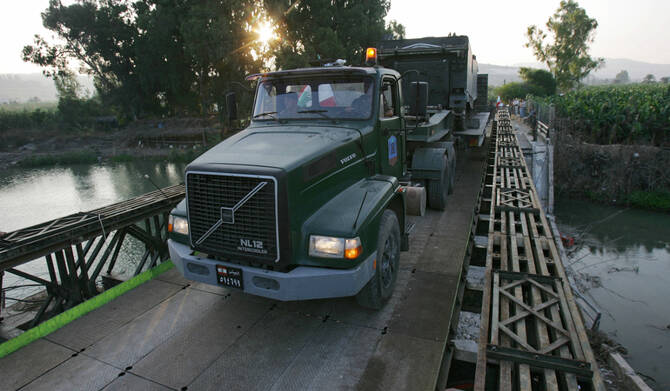BEIRUT: The Lebanese army on Saturday continued to detonate munitions left over from the Israeli war in southern Lebanon, as well as confiscating ordnance in the area south of the Litani River.
Explosions were heard across southern Lebanon, accompanied by reconnaissance flights from Lebanese army Cessna aircraft south of the Litani River.
During the most recent cabinet session, Army Commander Gen. Rudolph Haykal confirmed that it was no longer possible to cross the Litani River from north to south without passing through Lebanese Army checkpoints. The commander also reviewed the seizure and confiscation of equipment, weapons, and ammunition, presenting statistics from more than 5,000 missions.
In a statement earlier this week, President Joseph Aoun announced that weapons would be brought under state control this year. However, campaigns by Hezbollah officials threaten to disrupt the path outlined by President Aoun and Prime Minister Nawaf Salam to achieve this end. On Saturday, several Lebanese politicians came out against Hezbollah’s attempt to retain its weapons.
The Hezbollah leaders have not learned from the lessons of the catastrophe caused by their party.
Ashraf Rifi, MP and former justice minister
“The remaining Hezbollah leaders have not learned from the lessons of the catastrophe caused by their party,” said MP and former Justice Minister Ashraf Rifi, claiming that Hezbollah was being “reckless” and holding on to weapons “in support of Tehran, which is negotiating with the US at the expense of the Lebanese.”
He added: “These people appear to have lost essential wisdom and reasoning skills. Sooner or later, the weapons will be surrendered and dismantled; history does not move backward.”
Rifi’s comments followed a series of statements from Hezbollah in recent days, in which the group rejected the notion of surrendering its weapons to the state. They issued a threat to “cut off the hand” of anyone who tried to disarm them.
Hezbollah Secretary-General Naim Qassem said on Friday: “Remove this issue from your vocabulary, as no one will disarm us.”
He added that an Israeli withdrawal and reconstruction efforts must come before any discussions of a defense strategy.
Iranian Ambassador to Lebanon Mojtaba Amani endorsed Hezbollah’s stance, stating on Saturday that “the disarmament project is a clear plot against countries,” and warning against “falling into Israel’s trap.”
The Iranian diplomat posted on X: “While the US supplies the Israeli regime with the latest weapons and missiles, it simultaneously prevents other countries from strengthening and arming their militaries. Using various pretexts, it pressures them to reduce or destroy their arsenals.”
He added that when countries agree to disarmament demands, they become vulnerable to attacks and occupations, citing Iraq, Libya, and Syria as examples.
Amani stressed that Iran was aware of the dangers posed by “this conspiracy and its threat to regional nations’ security.”
He said: “We warn others not to fall into Israel’s trap, as maintaining deterrence is the first line of defense for sovereignty and independence, and it should not be put at risk.”
Hezbollah’s position has drawn widespread criticism, however. MP Paula Yacoubian characterized it as a strategy to enhance Iran’s negotiation position with the US, and said Lebanon was being used as a bargaining chip.
“Iran, which has poured billions into Hezbollah, now seeks greater returns,” she said. “To preserve the regime, it is time to make concessions, and the party must stop repeating outdated rhetoric while reclaiming its Lebanese identity.”
Former President Michel Suleiman said in a statement: "No to threats of cutting off hands. No to hints of civil war. No to discussions about the army's weaknesses. No to claims regarding the strength of the resistance. No to the idea of keeping weapons in the south, the mountains, the Bekaa, the north, or Beirut in the hands of anyone other than the state.
"Why is this important? Because if the state does not control weapons, then the state and its institutions will not survive.
"Consequently, the economy will not prosper, and we will not restore our friendship with our sister state or the international community."
Lebanese Forces leader Samir Geagea stated that “resorting to threats, especially regarding severing hands, has no place in a democratic state or a country seeking civil peace.”
He urged those using such rhetoric to stop, as their actions have already caused “significant harm and damage to Lebanon and its people,” adding that they should step aside and “allow the new leadership to guide the country out of the tragedy” they have created.
Geagea also urged Hezbollah to focus on “rebuilding an effective state capable of restoring dignity, pride, and a decent life for the Lebanese people, and take the initiative to facilitate reconstruction efforts.”
A political source told Arab News that Hezbollah’s rejection of disarmament, most recently expressed by Naim Qassem, aimed to preserve internal balance and boost morale within the party.
“Meanwhile, the Iranian position indicates that Iran is trying to control Hezbollah. There may also be another explanation: they may be seeking to gain time,” said the source.
















